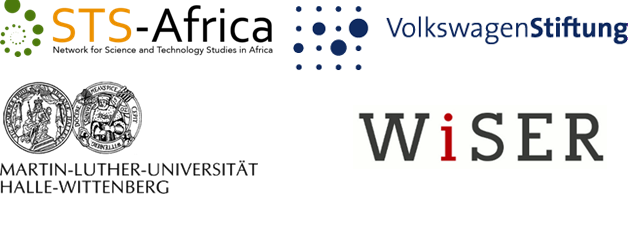Mapping Science and Technology in Africa: Traveling Technologies and Global Dis\orders
In the wake of the contemporary confluence of liberal reforms, recast geopolitical architectures, emerging domains of global governance as well as new global circuits of informational and material exchange, novel figurations of modernising reconstruction and institutional change have gained prominence. These figurations hold multiple, often contradictory, promises and effects for specific societies.
 Dates: 12-15 February 2014
Dates: 12-15 February 2014
Venue: Wits Institute for Social & Economic Research (WISER), Johannesburg, South Africa
Please register for the workshop here.
A full program of the Johannesburg STS-Africa Meeting 2014 is available
Science and technology have come not only to play an important role in these transformations but also for grasping them analytically. In these circumstances, the conference wants to trace figurative contours of current processes of modernisation in Africa by focusing on:
1) New strategic visions, articulated in both new development paradigms and analyses of the growing levels of global investment in African economies (e.g. Private Public Partnerships),
2) New conceptions of modernising interventions at the intersection of development, capital accumulation and global concerns (e.g. HIV/AIDS, climate change),
3) The proliferation of new technologies of impartial governance in political and economic management (e.g. based on the use of performance measures and scientific evidence).
4) The rise of African self-reliance and determination, involving the heightened prominence of African actors, ideas and choices in the project of modernisation at all levels.
In the face of these four novel developments (there are certainly others) the conference will aim to carve out the forms, origins, dynamics and effects of political, economic and societal reconstruction in a liberalised and globalised Africa. Analyses of the African present and the future have to account for the translation of both inherited knowledge and technology and its global circulation. From a different perspective, an understanding of global science and technology from an African vantage point puts some unique contexts and research fields on the agenda.
The conference will focus on the study of what we term ‘traveling technologies’ as a way of conceptualising the different fields enumerated above. The analysis of such traveling technologies makes it possible to review the transformation of a series of intersecting organisational and societal fields, including state administration, legal regulation, service provision, patterns of accumulation, and class formation. At the same time it enables us to scrutinise the impacts of modernisation on life-worlds, and the ways people have to re-orient and experience security and wellbeing or the absence of it. In these ways, our focus on traveling technologies promises to open up the question of how projects of modernity in Africa relocate knowledge and society in broader global orders and networks of exchange.
Analytical focus of the conference: Traveling Technologies
The conference will address contemporary processes of modernisation by concentrating on the study of traveling technologies, promoting both conceptual and empirical work. Technology, in our broad usage, is understood as an analytic category that includes enabling devices (e.g. pharmaceuticals), infrastructures and large technical systems (e.g. telecommunication systems), modes of governance (e.g. bureaucracy) and forms of subjectivation (e.g. counselling). Thus technologies are not solely conceptualised as material entities, but also as styles of organisation, procedures of standardisation, and the use of particular forms of rhetoric. For this reason some prefer to speak of techniques; the advantage of this broad usage of the term is a theoretical and methodological one. On the one hand, it attests to the fact that modernisation enterprises, in the Global South as well as North, are mostly less about innovation but about the translation and creative adaptation of technologies from elsewhere. Supposing technology transfer as a central kernel around which modernisation revolves, we can consider technologies as a vantage point from which we can structure our analyses of modernising transformation. In terms of methodology, furthermore, the concept allows for comparative projects of modernisation across places, sectors and topics. Concentrating on technologies in this way means also referring to a substantial body of methodological and theoretical literature, mainly coming out of the philosophy and history of science, as well as from Science and Technology Studies (STS).
Talking about Traveling Technologies implies the assumption, that something needs to be creatively adjusted when being transferred. In this sense traveling technologies refer to the transfer of epistemic, normative and material elements from one contextual environment into another. This process of transfer and contextual reconnection as well as the institutionalisation of new technologies is conceived as an operational process shifting existing political, economic and societal orders. The operational process is thereby also understood as a process of co-production, causing differently layered effects and multiple flows. Investigating traveling technologies empirically demands that we analyse the global through the study of specific translocal connections. Moreover, it shows how new relations between people, things and ideas are constituted and institutionalised by focusing on the situational and grounded character of negotiations in particular places. Finally, it directs attention to the multiple reverberations of concrete transfer initiatives and projects of modernisation. Thus the relation and distinction between what is global and what is local is defined in these enterprises of modernity, in the events when distant actors meet and mutually reconstitute themselves and their spheres of influence.
Organising Team
Junior Organizers: Faeeza Ballim, Luísa Reis-Castro, Natasha Vally, Norman Schräpel & Thomas Thadewaldt
Conference Advisors: Keith Breckenridge & Richard Rottenburg
